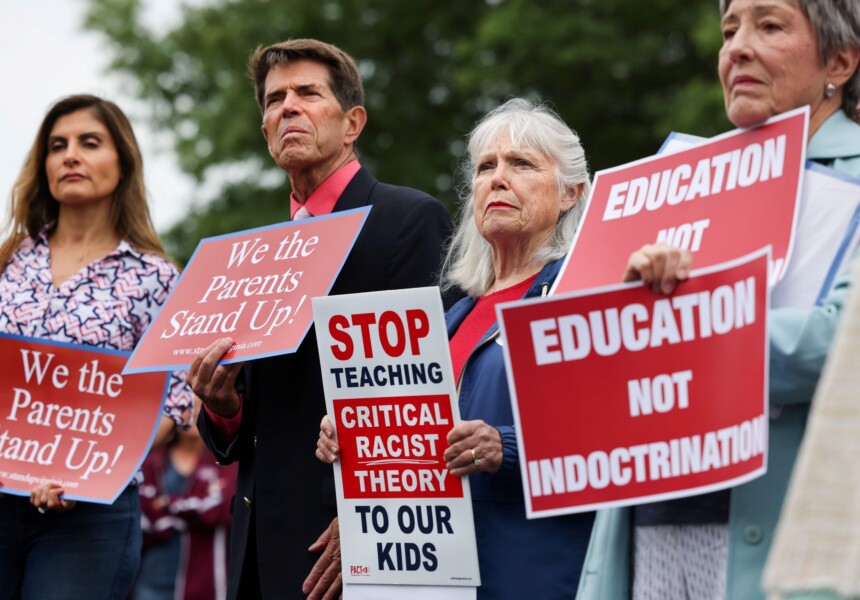Impassioned attacks on critical race theory (CRT) are the subject of AMAC Magazine’s August issue. A publication of The Association of Mature American Citizens, a Republican alternative to the American Association of Retired People, the magazine’s lead editorial by Robert B. Charles described CRT as an “anti-American … rebranding of Marxism.” This is equally true of most of the issue’s thematically related accompanying articles, all of which repeated some variation of the following formula: CRT is a foreign import of Marxist derivation that teaches the opposite of what we should believe as Americans.
Charles ended his essay by exhorting individuals not to buy into the resentment and blame game of Marxist CRT. “Americans cleave by values, not skin color,” he wrote. “Critical race theory is junk—a disgrace.”
Yet Charles does not show that CRT is Marxist nor that it’s anti-American, only that it is something he doesn’t like and would prefer not having taught in our schools. I share his preference, but view the target of his diatribe rather differently.
CRT, as these denunciations suggest, is an unpleasant and not well-substantiated collection of antiwhite charges and narratives. Yet contrary to the offended response in the magazine, CRT has developed in our own country, not elsewhere, and it seems to be an inversion of traditional patriotic myths. It calls to mind German anti-fascism, which reduces the onetime honored German fatherland to an object of hate.
It is also clear to me that CRT is not principally about race, any more than it is about Marxism. It is about laying guilt trips on those whom our elites seek to control and using race as a way of achieving one’s ultimate purpose.
The same process has always been at work in talk by German social critics about “overcoming” their national past. This supposed task reveals an increasingly transparent effort to reconstruct people’s minds and to make them responsive to an expanding leftist social agenda. One starts with something as blatantly evil as Nazi war crimes, and then extends the stigma of Nazi-like activities to the failure to have open borders or to provide sufficient instruction in LGBT lifestyles in elementary schools. Mention of some initial injustice or atrocity, such as the Holocaust—which unfortunately happened—allows the cultural left to get its foot in the door to inflict its plan on the rest of us for broad social reconstruction.
In America we are committed to the proposition that “all men are created equal,” and even though we have not always lived up to that ideal, we are now trying to make good on the promise of our founding. But there are certain distinctions that should be made if we hope to transcend the divisiveness of CRT.
America stands for equality of opportunity, not equality of results; building a color-blind society is different from harping on white racial guilt. It is ridiculous to imagine that you get ahead of the story by arguing that it is only partly true, e.g., by telling the young and our critics that we used to be wretched racists, but we aren’t any longer; or that we have always been committed to inclusiveness, but for a while forgot about it or betrayed that ideal.
The paramount question is not whether these expressions of hate rest entirely on authenticated historical facts. What we should be asking is why intellectuals and the media hate their societies and their heritages enough to fabricate these uniformly negative images.
Why must we view the U.S. as being required to practice what English political thinker Michael Oakeshott described as “telocratic politics,” a collectivist existence organized around a highest moral value? Why can’t we have a government under law providing its citizens with ordered liberty?
Even if the Declaration tells us that in some limited sense “all men are created equal,” why must we obsess over that statement and make it define our overriding goal as a country? And to whatever extent we are morally preoccupied with that overriding egalitarian goal, are we justified in distinguishing “equality of opportunity” from equity or “equality of result”?
The left, in my opinion, may be correct on this point. Until we achieve a more level playing field, we may not be able to realize “equality of opportunity,” an ideal that seems different from what Napoleon and European liberals of the 19th century spoke of as “careers open to talent.” It is one thing to advance the most fit for demanding posts and to educate the most talented of all social classes; it is another matter to aim at human equality, in a situation in which social, material, and biological opportunities have not been evenly distributed. It then becomes the duty of the telocratic state to make opportunities more equal, so that we can all compete without a situation in which some enjoy more advantages than others at the starting gate.
As Brion McClanahan pointed out here in “Stop Playing the Left’s Game,” (July 2021 Chronicles), the left is simply better at arguing leftist positions. In the end, CRT is not the main teaching in this process, but merely a prologue to the rest of the woke agenda.
Image Credit:
Opponents of the academic doctrine known as Critical Race Theory protest outside of the Loudoun County School Board headquarters, in Ashburn, Virginia, U.S. June 22, 2021. (REUTERS/Evelyn Hockstein)



Leave a Reply